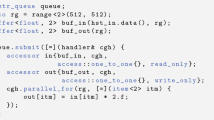Abstract
The increased number of execution units in many-core processors is driving numerous paradigm changes in parallel systems. Previous techniques that focused solely upon obtaining correct results are being rendered obsolete unless they can also provide results efficiently.
This paper dives into the particular problem of efficiently supporting fine-grained task creation and task termination for runtime systems in shared memory processors.
Our contributions are inspired by our observation of High Performance Computing (HPC) programs, where it is common for a large number of similar fine-grained tasks to become enabled at the same time.
We present evidence showing that task creation, assignment of tasks to processors, and task termination represent a significant overhead when executing fine-grained applications in many-core processors.
We introduce the concept of the polytask, wherein the similarity of tasks created at the same time is exploited to allow faster task creation, assignment and termination. The polytask technique can be applied to any runtime system where tasks are managed through queues.
The main contributions of this work are:
-
1
The observation that task management may generate substantial overhead in fine-grained parallel programs for many core processors.
-
2
The introduction of the polytask concept: A data structure that can be added to queue-centric scheduling systems to represent groups of similar tasks.
-
3
Experimental evidence showing that the polytask is an effective way to implement fine-grained task creation/termination primitives for parallel runtime systems in many-core processors.
We use microbenchmarks to show that queues modified to handle polytasks perform orders of magnitude faster than traditional queues in some scenarios. Furthermore, we use microbenchmarks to measure the amount of time spent executing tasks. We show situations where fine-grained programs using polytasks are able to achieve efficiencies close to 100% while their efficiency becomes only 20% when not using polytasks. Finally, we use several applications with fine granularity to show that the use of polytasks results in average speedups from 1.4X to 100X depending on the queue implementation used.
This research was, in part, funded by the U.S. Government. The views and conclusions contained in this document are those of the authors and should not be interpreted as representing the official policies, either expressed or implied, of the U.S. Government.
Access this chapter
Tax calculation will be finalised at checkout
Purchases are for personal use only
Preview
Unable to display preview. Download preview PDF.
Similar content being viewed by others
References
Barik, R., Budimlic, Z., Cave, V., Chatterjee, S., Guo, Y., Peixotto, D., Raman, R., Shirako, J., Tasirlar, S., Yan, Y., Zhao, Y., Sarkar, V.: The habanero multicore software research project. In: Proceeding of the 24th ACM SIGPLAN Conference Companion on Object Oriented Programming Systems Languages and Applications, OOPSLA 2009, pp. 735–736. ACM, New York (2009)
Blumofe, R.D., Joerg, C.F., Kuszmaul, B.C., Leiserson, C.E., Randall, K.H., Zhou, Y.: Cilk: an efficient multithreaded runtime system. In: Proceedings of the Fifth ACM SIGPLAN Symposium on Principles and Practice of Parallel Programming, PPOPP 1995, pp. 207–216. ACM, New York (1995)
Butenhof, D.R.: Programming with POSIX threads. Addison-Wesley Longman Publishing Co., Inc., Boston (1997)
Charles, P., Grothoff, C., Saraswat, V., Donawa, C., Kielstra, A., Ebcioglu, K., von Praun, C., Sarkar, V.: X10: an object-oriented approach to non-uniform cluster computing. SIGPLAN Not. 40, 519–538 (2005)
del Cuvillo, J., Zhu, W., Hu, Z., Gao, G.R.: Fast: A functionally accurate simulation toolset for the cyclops-64 cellular architecture. CAPSL Technical Memo 062 (2005)
del Cuvillo, J., Zhu, W., Hu, Z., Gao, G.R.: Toward a software infrastructure for the cyclops-64 cellular architecture. In: High-Performance Computing in an Advanced Collaborative Environment, p. 9 (May 2006)
Dagum, L., Menon, R.: Openmp: an industry standard api for shared-memory programming. IEEE Computational Science Engineering 5(1), 46–55 (1998)
Gao, G., Suetterlein, J., Zuckerman, S.: Toward an execution model for extreme-scale systems-runnemede and beyond. CAPSL Technical Memo 104
Garcia, E., Venetis, I.E., Khan, R., Gao, G.R.: Optimized Dense Matrix Multiplication on a Many-Core Architecture. In: D’Ambra, P., Guarracino, M., Talia, D. (eds.) Euro-Par 2010, Part II. LNCS, vol. 6272, pp. 316–327. Springer, Heidelberg (2010)
Knobe, K.: Ease of use with concurrent collections (cnc). In: Proceedings of the First USENIX Conference on Hot Topics in Parallelism, HotPar 2009, p. 17. USENIX Association, Berkeley (2009)
Mellor-Crummey, J.: Concurrent queues: Practical fetch and phi algorithms. Tech. Rep. 229, Dep. of CS, University of Rochester (1987)
Michael, M.M., Scott, M.L.: Simple, fast, and practical non-blocking and blocking concurrent queue algorithms. In: Proc. of the 15th ACM Symposium on Principles of Distributed Computing, PODC 1996, pp. 267–275. ACM, New York (1996)
Orozco, D., Garcia, E., Pavel, R., Khan, R., Gao, G.R.: Tideflow: The time iterated dependency flow execution model. CAPSL Technical Memo 107 (2011)
Orozco, D., Garcia, E., Gao, G.: Locality Optimization of Stencil Applications Using Data Dependency Graphs. In: Cooper, K., Mellor-Crummey, J., Sarkar, V. (eds.) LCPC 2010. LNCS, vol. 6548, pp. 77–91. Springer, Heidelberg (2011)
Orozco, D.A., Gao, G.R.: Mapping the fdtd application to many-core chip architectures. In: Proceedings of the 2009 International Conference on Parallel Processing, ICPP 2009, pp. 309–316. IEEE Computer Society, Washington, DC (2009)
Shafiei, N.: Non-blocking Array-Based Algorithms for Stacks and Queues. In: Garg, V., Wattenhofer, R., Kothapalli, K. (eds.) ICDCN 2009. LNCS, vol. 5408, pp. 55–66. Springer, Heidelberg (2008)
Theobald, K.: EARTH: An Efficient Architecture for Running Threads. Ph.D. thesis (1999)
Author information
Authors and Affiliations
Editor information
Editors and Affiliations
Rights and permissions
Copyright information
© 2013 Springer-Verlag Berlin Heidelberg
About this paper
Cite this paper
Orozco, D., Garcia, E., Pavel, R., Khan, R., Gao, G.R. (2013). Polytasks: A Compressed Task Representation for HPC Runtimes. In: Rajopadhye, S., Mills Strout, M. (eds) Languages and Compilers for Parallel Computing. LCPC 2011. Lecture Notes in Computer Science, vol 7146. Springer, Berlin, Heidelberg. https://doi.org/10.1007/978-3-642-36036-7_18
Download citation
DOI: https://doi.org/10.1007/978-3-642-36036-7_18
Publisher Name: Springer, Berlin, Heidelberg
Print ISBN: 978-3-642-36035-0
Online ISBN: 978-3-642-36036-7
eBook Packages: Computer ScienceComputer Science (R0)




